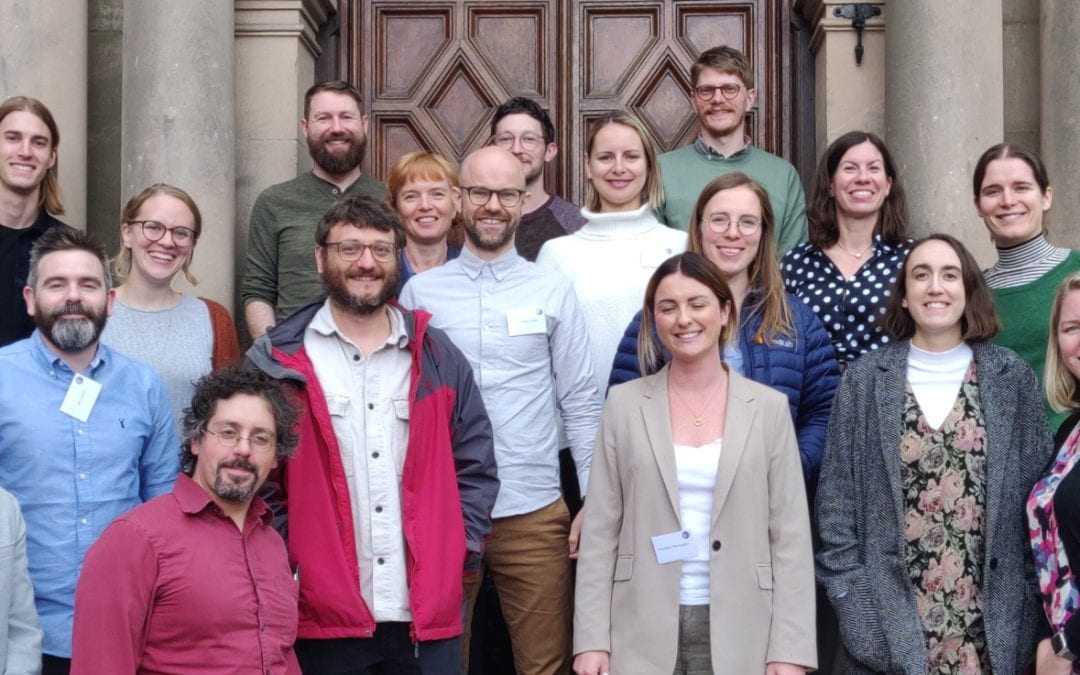Written by Vicky Hellon and Alden Conner, The Alan Turing Institute, UK.
The UKRN Local Network Leads (LNLs) are the network’s grassroots reproducibility representatives and points of contact at their respective institutions. There are 79 LNLs across 66 institutions and the annual summer retreats are an opportunity for LNLs to come together and build a sense of community.
Organised by the central UKRN team, this year’s summer retreat took place in the beautiful Keele Hall, part of the Keele University Campus. Across two days (with excellent food!), 18 LNLs gathered to share challenges from their networks, brainstorm new ideas on how to get researchers enthused about reproducibility and discuss new developments in this area.
After introductions, our first session was an update on the Science and Technology Committee Report into reproducibility and research integrity. Marcus Munafo, lead of UKRN, gave an overview of the committee process and the evidence submitted by UKRN. The resulting report gave multiple recommendations around issues such as data sharing, registered reports and postdoc contracts which were well received but hampered by the fact that a lot of the recommendations cannot be enacted by government and need to come from institutions such as universities and publishers. We discussed whether UKRN could create briefing papers on these kinds of reports that LNLs and Institutional Leads could disseminate to their networks to ensure that institutions are aware of (and should care about!) what is going on in the wider ecosystem. Our second session was brainstorming content for a LNL guidebook, with ideas floated such as case studies, workload expectations, aligning LNL activities with your career goals and how to engage across institutions.
The second day consisted of sessions on succession planning for handing over your LNL role, helping to set priorities for the new UKRN community roles, a Q&A with the UKRN central team, and an unconference session. The unconference session consisted of six sessions, with each person attending three out of these six. The sessions were: characteristics of a good/bad research culture; a survey around training in methodology, study design, and statistics; a practical sharing session on what LNLs have been doing; how to tackle PIs to get them engaged; how to monitor open and reproducible research for REF28; and how to engage new people in your local networks.
Overall, the 2023 LNL summer retreat highlighted both the challenges and opportunities for advancing reproducibility practices through our local networks. A key theme that emerged was a desire to work more across disciplines, while recognizing that different disciplines interpret reproducibility differently and may have their own approaches around promoting good practices as well as differing sets of goals. Recognising this, we are keen to work together to learn from each other and learn new methods that may benefit our own disciplines. To that end, the LNLs considered how a more formal onboarding process could help introduce them to others in the network in order to form a community of practice where we share lessons learned and provide support to those setting up new local networks or taking over the post of LNL.
Many of the attendees expressed concerns that engagement with the local network has plateaued, as many researchers assume that reproducible practices are a given in their field and they may not feel the need to seek out guidance on reproducible research. We hope that a strong LNL network will provide a space for collaborating and sharing resources to encourage people to think about the next steps their network can take to further reproducibility and openness, particularly when researchers feel disengaged.
Group photo taken by Neil Jacobs at the end of the retreat: Front row: Cecil Cherian Lukose (Northumbria LNL representative), Michel Belyk (Edgehill LNL). Second row: Ian Lahart (Wolverhampton LNL), Alexis Makin (Liverpool LNL), Charlotte Pennington (Aston LNL), Vicky Hellon (Alan Turing LNL), Alden Conner (Alan Turing LNL). Third row: Crispin Jordan (Edinburgh LNL representative), Helen Gray (Newcastle LNL), Eike Rinke (Leeds LNL), Amy Orben (Cambridge LNL), Sophia Crüwell (Cambridge). Fourth row: Nick Ballou (Queen Mary London LNL), Diane Hird (UKRN), Mae Chester-Jones (Oxford LNL), Suzanne Stewart (Chester LNL). Back row: Will Gawned (UKRN), David Ellis (Bath LNL), Sam Westwood (King’s College London). Missing from photo – Andrew Crump (Royal Veterinary College LNL).

